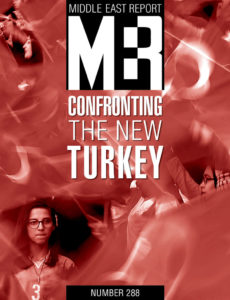On 21 December 2018, Middle East Report [MERIP] Issue #288, “Confronting the New Turkey,” was officially published for subscribers. UMW Associate Professor of Middle Eastern History Nabil Al-Tikriti joined the team of developers and editors who invited contributors and edited content for the issue, available online here: https://merip.org/magazine/288/.
 The Issue Development Team (IDT) consisted of Profs. Elif Babül of Mt. Holyoke College, Nabil Al-Tikriti, and Ayça Alemdaroğlu of Northwestern University. Dr. Steve Niva was the executive editor.
The Issue Development Team (IDT) consisted of Profs. Elif Babül of Mt. Holyoke College, Nabil Al-Tikriti, and Ayça Alemdaroğlu of Northwestern University. Dr. Steve Niva was the executive editor.
Press Release: “Since the failed July, 2016 coup attempt, Turkey’s President Erdoğan and his ruling Justice and Development Party (AKP) have consolidated their unfettered rule over Turkey. This counter-coup has been undertaken through massive purges in the military, judiciary, media and academia—with tens of thousands detained or forced into exile—the shuttering of independent civic institutions and enshrining virtually unchecked executive power in a new constitution. Turkey’s authoritarian turn bears an elective affinity with emerging forms of populist authoritarianism and illiberal democracy, as well as anti-immigrant and anti-globalist sensibilities, that have redrawn the European political map and largely crushed nascent democratic risings across the Middle East.
Contributors to Confronting the New Turkey disentangle the social, political and economic factors that led to the manifestation of this global trend in Turkey. How Erdoğan accomplished this opens a window on the autocrat’s handbook for the twenty-first century. Contributors also illuminate lines of resistance, vulnerabilities and contradictions within the New Turkey under construction. Middle East Report 288 is partially available on-line with full access to all the articles available to our subscribers.
Aslı Bâli offers an incisive and detailed anatomy of Turkey’s 2017 constitutional coup: how Erdoğan used constitutional tools to dismantle Turkey’s parliamentary system from within and create a new form of constitutional authoritarianism.
Yahya Madra critically analyzes the roots of Turkey’s current economic crisis via the AKP’s embrace of a form of globalized neoliberal capitalism that is now at odds with Erdoğan’s electoral needs and authoritarian inclinations.
Evren Balta explains the dramatic shifts and abrupt reorientations of Turkish foreign policy over the past decade as a product of the AKP and Erdoğan’s populism: foreign policy deployed as a tool of governance to mobilize support, tarnish enemies and keep the AKP in power.
Cuma Ҫiçek provides a thorough overview of the transformation of Turkish-Kurdish politics since 1999, including promising but flawed peace initiatives, the impact of Rojava on Kurdish politics and the return to war in Turkey’s Kurdish regions.
Muzaffer Kaya offers a powerful assessment of the damage wrought by Turkey’s sustained state repression of higher education since 2015, including the purge of over 6,000 academics and university workers. (Available to Everyone)
Volkan Yılmaz uncovers the rising inequality and unfulfilled promises of economic justice that can be traced to the AKP’s embrace of market-led policies in housing and construction.
Sinan Erensü reveals a series of contradictions and vulnerabilities that afflict Turkey’s rapid expansion of energy infrastructure and its pursuit of energy independence, including rural environmental resistance and Turkey’s resistance to climate change initiatives.
Hikmet Kocamaner demonstrates how the AKP’s embrace of “family values” rhetoric and family-centered policies are central to its broader political and social vision predicated on neoconservative, neoliberal and neo-patriarchal rationalities.
Ayça Alemdaroğlu reveals how widespread youth disaffection with the AKP has led the Party to expand a parallel religious education system and increase investments in youth-centered organizations in an effort to overcome obstacles to its hegemony.
Mucahit Bilici unravels the surprising rise of heterodox religiosity and even atheism among pious Turkish youth in response to the instrumentalization of religion under the AKP and broader secularizing trends within Turkish society.
In an inspiring interview, the architect and activist Mücella Yapıcı discusses the still unwritten history of the Gezi Park protests, which, for a moment, revealed a new anti-authoritarian, multi-cultural and democratic Turkey that is yet to come. (Available to Everyone)
Subscribe to Middle East Report or order individual copies here.
Middle East Report is published by the Middle East Research and Information Project (MERIP), a progressive, independent organization. Since 1971 MERIP has provided critical analysis of the Middle East, focusing on political economy, popular struggles and the implications of US foreign policy for the region.
Middle East Report Online is a free service of the Middle East Research and Information Project (MERIP).